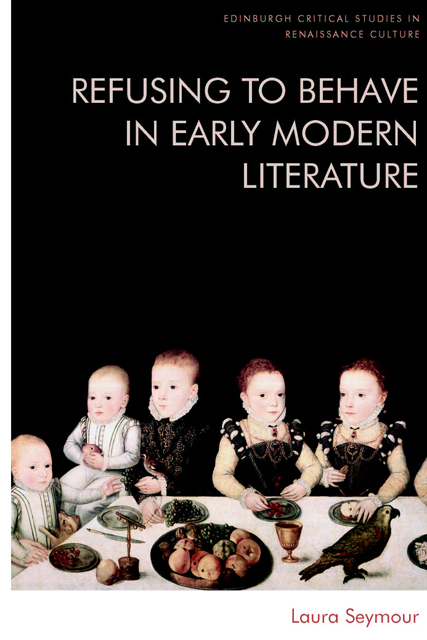Book contents
- Frontmatter
- Contents
- Acknowledgements
- Series Editor’s Preface
- Introduction: The Body at Play in Early Modern Texts
- 1 Ungracious Grace: Proprioception and Staging Taste in Thomas Dekker’s If This Be Not a Good Play, the Devil Is in It (1611)
- 2 Walking Without God – (Mis)Learning Through the Gait in Mateo Alemán’s Guzmán de Alfarache (1599 and 1604) and James Mabbe’s The Rogue (1622)
- 3 Plain Plasticity – Thomas Ellwood’s The History of the Life of Thomas Ellwood (1714)
- 4 Chaste and Silent – Again. Vitality and the Bound and Loosed Body in I.T.’s Grim the Collier of Croydon; or, The Devil and His Dame (c. 1600)
- Index
1 - Ungracious Grace: Proprioception and Staging Taste in Thomas Dekker’s If This Be Not a Good Play, the Devil Is in It (1611)
Published online by Cambridge University Press: 25 April 2023
- Frontmatter
- Contents
- Acknowledgements
- Series Editor’s Preface
- Introduction: The Body at Play in Early Modern Texts
- 1 Ungracious Grace: Proprioception and Staging Taste in Thomas Dekker’s If This Be Not a Good Play, the Devil Is in It (1611)
- 2 Walking Without God – (Mis)Learning Through the Gait in Mateo Alemán’s Guzmán de Alfarache (1599 and 1604) and James Mabbe’s The Rogue (1622)
- 3 Plain Plasticity – Thomas Ellwood’s The History of the Life of Thomas Ellwood (1714)
- 4 Chaste and Silent – Again. Vitality and the Bound and Loosed Body in I.T.’s Grim the Collier of Croydon; or, The Devil and His Dame (c. 1600)
- Index
Summary
The power of the kinaesthetic imagination, defined in the introductory chapter, is demonstrated in Thomas Dekker’s 1611 play, If This Be Not a Good Play, the Devil Is in It when a novice monk, Friar Rush, comes forward to say grace before the daytime meal in his monastery. The play is set in Naples; the group of Italian monks preparing to dine immediately suggests (to English Protestants) a long history of Protestant depictions of monks devoted to the pleasures of the flesh, especially eating and drinking, to the exclusion of all else. Dekker’s company performed If This Be Not Good on the amphitheatre stage of London’s Red Bull Theatre (located off busy St John Street). Rush may have been accompanied by an ominous firework or two – the Red Bull was famed for its noisiness and pyrotechnic special effects – and, as we shall see below, it is possible that Rush wore a prosthetic cow’s tail and horns. Rush is asked, as a novice, to ‘say grace demurely’ and ‘waite on the Priors Trencher soberly’, expectations he swiftly thwarts. Rather than delivering a pious grace focusing the other monks’ minds on God, Rush offers a grace designed to generate greedy effects in their bodies, minds, and souls. His grace prompts the monks to imagine delicious tastes and envisage their bodies stretching as they fill with abundant food. By means of this exercise in embodied imagination, the grace sends the monks’ souls veering towards the fires of hell. Such a shift into eschatology – Dekker takes us from a daily pre-meal prayer to a drawn-out depiction of sinners forcibly gorged with searing, painful foods and drinks in hell – is striking and should give us pause. This chapter traces how proprioceptive language of fullness, greasiness, and heat, stemming from and fanning out from the grace, brings about this disastrous result.
By staging his characters lingering over the meal preparations, Dekker draws attention to the monks’ table and its loadings. The cook Scumbroath announces the scene by entering ringing a bell, accompanied by Rush bringing in ‘a cloth to lay’; Rush and Friar Alphege chat while setting the table.
- Type
- Chapter
- Information
- Refusing to Behave in Early Modern Literature , pp. 8 - 35Publisher: Edinburgh University PressPrint publication year: 2022



